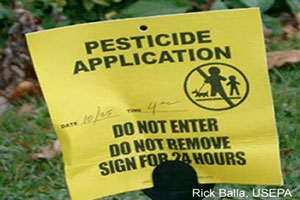
Did you know that Suffolk County has a law banning the application of fertilizer between November 1st and April 1st? Click here for more information about the law.
Using pesticides and fertilizers on your lawn or garden poses a threat to water quality. Even though you are applying these chemicals directly to your lawn, there are many ways that they can percolate to groundwater, become airborne, or run off into storm drains and eventually surface waters. Fertilizers and pesticides should be used sparingly or not at all. If you choose to use fertilizers or pesticides on your lawn, it is important to be a responsible user of these chemicals. Minimize your contribution to water pollution!
Here are some tips and resources to help you maintain a healthy lawn, while doing your best to protect the environment as well:
- Consider maintaining your lawn without pesticides or fertilizers and using native grasses and plants. While this may require a little more work, the benefits to human health and the environment are worth it!
Check out
Cornell Cooperative Extension's Lawn Care without Pesticides
-
Consider Integrated Pest Management (IPM) as an alternative to pesticide use. IPM is an approach to pest management that uses little or no chemical treatment to remove unwanted pests with minimal damage to human health, water quality, and the environment, including organisms that are not harmful.
There are many benefits to IPM, see the following resources:
NYDEC's brochure:
IPM in and around your home
Cornell University's Integrated Pest Management Program
-
If you need to use pesticides or fertilizers please keep the following in mind:
Never apply either fertilizers or pesticides before a rainfall is forecasted. The chemicals you apply will be washed away, leaving your lawn untreated and polluting surface waters.
Always follow the manufacturer's instructions when using pesticides, herbicides or fertilizers on your lawn or garden. Please don't "double the dose" for good measure. This only increases the amount that could get washed away.
When applying, be careful not to apply fertilizer to the driveway or sidewalk. These chemicals will easily be washed into the street and storm drains. Granular pesticides on these impervious surfaces should be swept up.
If you do use a fertilizer, choose one that contains at least 30 percent slow-release nitrogen and check the three numbers on the front of the bag to select the right mixture for your soil. The numbers represent the fertilizer’s percent nitrogen (first number), phosphorus (second number) and potassium (third number) content. The best way to determine what fertilizers you need is to have your soil tested pre-application.
Remember that using a fertilizer that a plant does not need, or applying fertilizers or pesticides beyond the recommended dose, is harmful and a waste of money! Excess chemicals will probably be washed away by stormwater.
Additional information:
NYSDEC's Information on Pest Management and Pesticide Use
NYSDEC's Pesticide Impacts on Fish and Wildlife
US EPA's Pollution Prevention/Good Housekeeping for Municipal Operations: Landscaping and Lawn Care
Next, lets look at BMPs for some common Household Chemicals